Related Research Articles

George Orson Welles was an American director, actor, writer, and producer who is remembered for his innovative work in film, radio, and theatre. He is considered to be among the greatest and most influential filmmakers of all time.
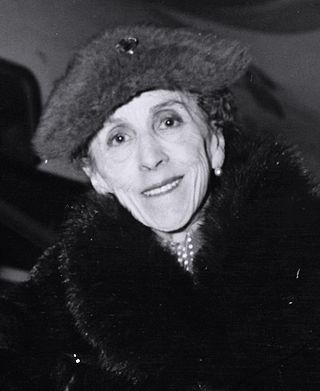
Baroness Karen Christenze von Blixen-Finecke was a Danish author who wrote in Danish and English. She is also known under her pen names Isak Dinesen, used in English-speaking countries; Tania Blixen, used in German-speaking countries; Osceola, and Pierre Andrézel.

Jeanne Moreau was a French actress, singer, screenwriter, director, and socialite. She made her theatrical debut in 1947, and established herself as one of the leading actresses of the Comédie-Française. Moreau began playing small roles in films in 1949, later achieving prominence with a starring role in Louis Malle's Elevator to the Gallows (1958). She was most prolific during the 1960s, winning the Cannes Film Festival Award for Best Actress for Seven Days... Seven Nights (1960) and the BAFTA Award for Best Foreign Actress for Viva Maria! (1965), with additional prominent roles in La Notte (1961), Jules et Jim (1962), and Le journal d'une femme de chambre (1964).

The Mercury Theatre was an independent repertory theatre company founded in New York City in 1937 by Orson Welles and producer John Houseman. The company produced theatrical presentations, radio programs and motion pictures. The Mercury also released promptbooks and phonographic recordings of four Shakespeare works for use in schools.

Around the World with Orson Welles is a series of six short travelogues originally written and directed by Orson Welles for Associated-Rediffusion in 1955, for Britain's then-new ITV channel. Despite its title emphasizing the world, it was entirely filmed in Europe. Among other incidents in the episodes, Welles visited Jean Cocteau and Juliette Gréco in Paris, attended a bullfight in Madrid and visited the Basque Country.
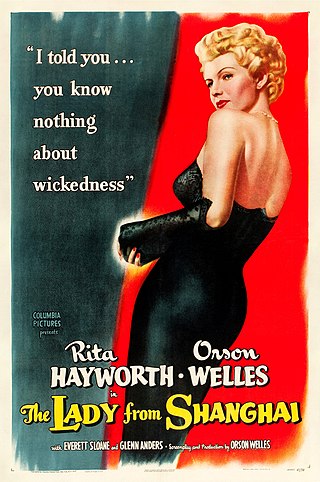
The Lady from Shanghai is a 1947 American film noir produced and directed by Orson Welles that stars Rita Hayworth, Welles and Everett Sloane. Welles's screenplay is based on the novel If I Die Before I Wake by Sherwood King.
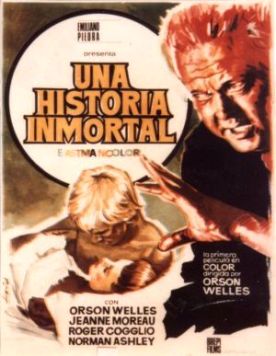
The Immortal Story is a 1968 French film directed by Orson Welles and starring Jeanne Moreau. The film was originally broadcast on French television and was later released in theatres. It was based on a short story by the Danish writer Karen Blixen. With a running time of sixty minutes, it is the shortest feature film directed by Welles.

The Other Side of the Wind is a 2018 satirical drama film co-written, co-edited, and directed by Orson Welles, and posthumously released in 2018 after 48 years in development. The film stars John Huston, Bob Random, Peter Bogdanovich, Susan Strasberg, and Oja Kodar.
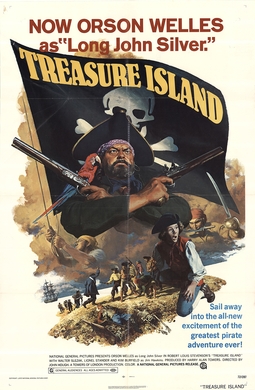
Treasure Island is a 1972 adventure film, based on the 1883 novel by Robert Louis Stevenson. The film stars Orson Welles as Long John Silver, Kim Burfield as Jim Hawkins, Walter Slezak as Squire Trelawney, Rik Battaglia as Captain Smollett, and Ángel del Pozo as Doctor Livesey.
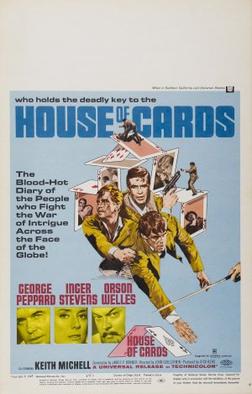
House of Cards is a 1968 American neo-noir crime film directed by John Guillermin and starring George Peppard, Inger Stevens, and Orson Welles. Filmed in France and Italy, it marked the third time that Peppard and Guillermin worked together.

Orson Welles (1915–1985) was an American director, actor, writer, and producer who is best remembered for his innovative work in radio, theatre and film. He is widely considered one of the greatest and most influential filmmakers of all time.
Andrés Vicente Gómez is a Spanish film producer, head of Lolafilms, with more than 100 films to his credit.
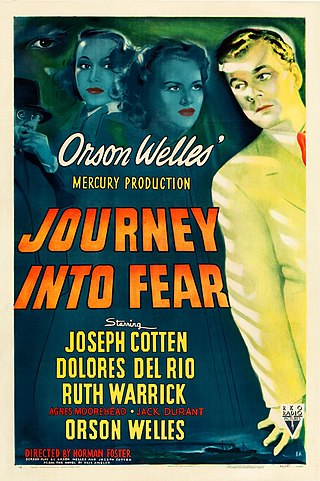
Journey into Fear is a 1943 American spy film noir directed by Norman Foster, based on the 1940 novel by Eric Ambler. The film broadly follows the plot of the book, but the protagonist was changed to an American engineer, and the destination of his journey changed from France to the Soviet Union—reflecting the changes in the war situation since the original Ambler book was written. The RKO Pictures release stars Joseph Cotten, who also wrote the screenplay with Orson Welles. The Mercury Production was also produced by Welles, again uncredited.
The Dreamers is an unfinished film project directed and produced between 1980 and 1982 by Orson Welles. Adapted from Karen Blixen stories, Welles co-wrote a script with his companion Oja Kodar and filmed a few scenes but was unable to complete the film due to financing problems.
Don Quixote is an unfinished film project written, co-produced and directed by Orson Welles. Principal photography took place between 1957 and 1969. Test footage was filmed as early as 1955, second-unit photography was done as late as 1972, and Welles was working on the film intermittently until his death in 1985. The film was eventually edited by Jesús Franco and was released in 1992, to mixed reviews.

The Merchant of Venice is a 1969 drama short film directed by Orson Welles based on William Shakespeare's play of the same name. While actually completed, it is frequently cited as an unfinished film, though better described as a partially lost film due to the loss of film elements.

Anecdotes of Destiny is a collection of stories by Danish author Karen Blixen written under the pseudonym Isak Dinesen. It was the last work published during Karen Blixen's lifetime, on October 12, 1958.
Willy Kurant was a Belgian cinematographer. Kurant began as a documentary cameraman before establishing himself as a director of photography for such filmmakers as Agnès Varda, Jean-Luc Godard, Orson Welles, Alain Robbe-Grillet, Jerzy Skolimowski, Chris Marker, Maurice Pialat, and Louis C.K.
This is a bibliography of books by or about the director and actor Orson Welles.
Twelfth Night is a 1933 American Pre-Code short color film, notable as the very earliest surviving film directed by Orson Welles, then aged 17. It is a recording of the dress rehearsal of Welles's own abridged production at his alma mater, the Todd School for Boys, where he had returned to direct this adaptation of Shakespeare's Twelfth Night for the Chicago Drama Festival in 1933. The play won first prize at that year's festival, presented as part of the 1933 Chicago World's Fair, A Century of Progress Exposition.